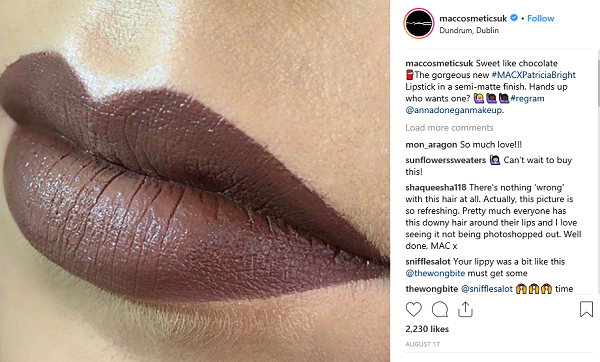
MAC Cosmetics aims to edit beauty standards
By: Kerry Ingram, Arts & Life Editor
Featured image courtesy of globalbeautynews.com
There are many a #snatched photo on Instagram. From bloggers posting pics of their shiny, waist-length hair despite the muggy weather (something us curly-girls know is pretty near impossible, but okay…), to fashion companies posting images of bodies with enviable proportions, it seems like the notion of only sharing ideal images hasn’t changed. Companies continue to post photoshopped images; brand flat-lay photos only showcase products in their best conditions. Even the average person can alter and edit their photos on a professional level now, with apps like FaceTune and VSCO helping everyone to look polished and put-together, 24/7.
Out of all the industries out there, one would think that the beauty industry would be the most guilty when it comes to editing images into unrealistic standards. According to a study conducted by The Sun UK, only 28 percent of ads within the beauty industry were untouched by photo editors of any kind. FaceTune, which can conceal and blur any imperfections, as well as realistically alter facial features, became Apple’s most popular paid app of 2017. In recent news, makeup brands like Becca Cosmetics have been busted for even using photoshop to alter their model’s ethnicities for swatches (which is an entire conversation in itself, but to see proof of this, check out the original photo of the swatches for Becca’s Skin Love foundation, in which the palms are colored in as a result of lazy photo editing).
Despite all of the hype around perfect pictures, one of the beauty industry’s biggest brands has decided to advocate realistic beauty, and it’s a brand no one would ever expect to do so: MAC Cosmetics.
The cosmetic retailer, known for its never-ending array of products and “full-beat” persona recently took to Instagram to share a few “real-skin” makeup photos through its U.S. and U.K. handles. The brand posted makeup pictures featuring close-ups of models’ makeup with zero edits, allowing for facial hair to shine through.
The brand did receive some backlash, with users poking fun at the model for her facial hair, however the negativity was drowned out by the onslaught of supportive comments towards the brand’s move. One user, @nesimaria_, wrote “Yes! Keep it real!!!” while another user, @ahoytabii, commented “This photo is absolutely everything!!! I love the more natural approach to capturing the model’s beauty. These are the kind of ads I want my children to seem someday.”
MAC’s move could make for a huge push in the right direction for the cosmetics industry. As someone who is an avid follower and participant within the online beauty community, I think it’s great that MAC decided to post unretouched photos, especially when it comes to showcasing peach fuzz and facial hair.
I can’t tell you the amount of times I have had someone in my makeup artistry chair, timidly expressing their embarrassment over the amount of fuzz they have above their upper lip, or stray hairs they have on their face. Most of the time, these people are grown women; women who have had time to learn more about their identities and embrace themselves as the beautiful individuals they are – and yet they are still shy telling a 21-year-old about the hair on their face. Each time, I always reassure them that everyone has facial hair to some extent (and if you’re reading this and going “Well I surely don’t,” I’m going to have to ask you to stop lying to yourself and take several seats, thank you). Imperfections are the common connector of us all; none of us are perfect and I think that conversation is important to have. It allows people to become more comfortable with themselves, and if a powerhouse brand like MAC is promoting such a conversation, I can see the beauty industry changing for the better.
HOWEVER, there’s always a flip-side. As much as I like to keep things real, I also understand people’s fascination with perfect images. It’s appealing to see things that seem perfect – it allows consumers to have a sense of need for a product and better prompts them to go buy it (or at the very least, follow your Instagram account). Some people may view this new natural approach as downgrading the brand, lessening its value and possibly leading to a loss in followers and brand persona.
I’m personally proud of MAC’s unretouched photos, but I also don’t hate retouching, and I have a feeling MAC feels the same way – despite these natural photos being posted, MAC still posts other photos with the classic beauty brand photoshop edits. The individual natural posts were a start, but only time will tell if they become the only option for the brand.
Now it’s your turn to sound off: do you think beauty brands should only post natural and realistic photos, or do you feel as though photoshopped images help to keep a sense of glamour and interest in the beauty industry? Let us know your thoughts on Twitter, where you can tweet us @TheTowerlight!

